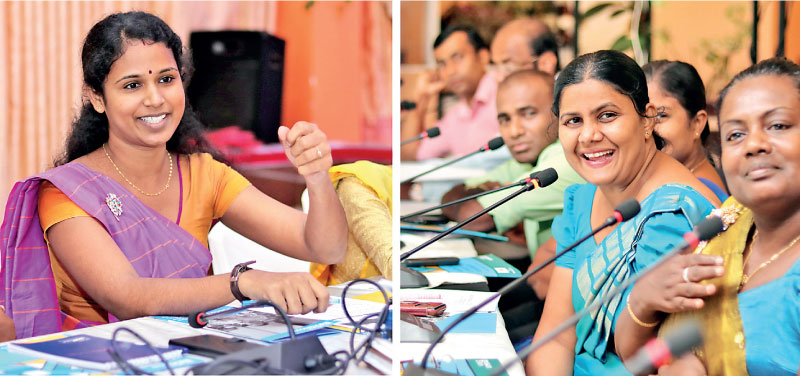Saturday Feb 21, 2026
Saturday Feb 21, 2026
Thursday, 15 June 2023 00:00 - - {{hitsCtrl.values.hits}}

 Conflicts and crises affect everyone, but do they affect everyone the same? Sri Lanka’s past shows how the legacy of armed conflict imposes particular hardships for women – whether through displacement, bereavement, or vulnerability to sexual violence and exploitation. And when we look at the country’s current economic crisis, we also see a disproportionate impact on women and girls. They are the first to be burdened with meeting care needs, the first to drop out of school, and the first to lose their livelihoods. Women and girls experience conflict and crises differently than men, and these varied impacts have narrowed the role of women in society.
Conflicts and crises affect everyone, but do they affect everyone the same? Sri Lanka’s past shows how the legacy of armed conflict imposes particular hardships for women – whether through displacement, bereavement, or vulnerability to sexual violence and exploitation. And when we look at the country’s current economic crisis, we also see a disproportionate impact on women and girls. They are the first to be burdened with meeting care needs, the first to drop out of school, and the first to lose their livelihoods. Women and girls experience conflict and crises differently than men, and these varied impacts have narrowed the role of women in society.
This is the premise of Sri Lanka’s National Action Plan on Women, Peace and Security, adopted in February and ceremonially launched on 8 March: to understand the specific needs that women and girls face during such times, and to ensure that laws and policies protect their rights.
Below are six ways that the National Action Plan, supported by UN Women and the Government of Japan, will support women and girls who are most marginalised during and in the aftermath of conflict and crises.
1.Reforming archaic laws and policies
The first priority of the National Action Plan is to reform outdated laws and policies to protect women and girls from gender-based violence and discrimination. This involves amending discriminatory provisions contained in personal laws where – for instance – a wife of a deceased man is excluded from property rights simply because they have no children. The persistence of such laws worsens inequalities and diminishes women’s economic empowerment, especially in times of crisis. Moreover, we have seen a spike in sexual and gender-based violence over the last three years amid the pandemic and the ongoing economic crisis. In response, the National Action Plan intends to reform Section 363 of the Penal Code on rape and incest to ensure that women and children are better protected, including the recognition of marital rape as an offence.
2. Addressing the impact of displacement
Secondly, the National Action Plan intends to improve the livelihoods and wellbeing of women who have been displaced by conflict and disasters. Proposed interventions include annual evaluations of the psychosocial needs of women, and establishing information desks at the airport to inform refugee returnees on administrative processes to obtain birth certificates and other documents. In addition, provisions will ensure those living in temporary housing have clean water and sanitation facilities, and receive access to second-chance education opportunities. This will ensure that women and girls displaced by conflict and crises continue to live a life with dignity.
3. Supporting military and police widows, women ex-combatants and female heads of households
Thirdly, the National Action Plan aims to improve access to state services in particular for military and police widows, women ex-combatants and female heads of households. This involves evaluating existing laws and policies and applying a gender perspective to ensure that they respond to the unique needs of those women, and that they receive targeted support, including psychosocial assistance. Measures will also be taken to provide them with sustainable livelihoods.
4.Ensuring women’s protection and security
Fourthly, measures will be taken to prevent violence against women, especially elderly women, women with disabilities, and members of the LGBTIQ+ communities. Key measures on this include developing a code of conduct guiding all three armed forces as well as the police on the relevant laws and policies to prevent sexual violence in conflict and post-conflict settings, and the establishment of a special unit to investigate cybercrimes and harassment based on factors such as gender and ethno-religious identity.
5.Investing in women’s economic empowerment
As women are often engaged in informal employment, they are less likely to benefit from social protection systems. Hence, those in low-income households are hit hardest by job losses and reduced income during crises. Lack of access to loans through the formal banking system is often an issue. Unlike formal banks, microcredit institutions often do not require collateral or proof of income to approve a loan. But their interest rates are often unduly high and the terms and conditions not fully explained. This results in women being forced to borrow more at exorbitant rates to pay the first loan – effectively trapping them in a debt cycle. And if they fail to repay on time, they face harassment and intimidation from the microcredit institutions. The National Action Plan aims to address these issues by creating mechanisms to ensure safe borrowing practices and educate women on financial literacy.
6. Promoting women’s participation in peacebuilding, leadership and governance
Lastly, to address the lack of representation and participation of women in politics and peacebuilding efforts, the National Action Plan aims to introduce provisions within the Parliamentary Elections Act No. 1 of 1981 to guarantee a minimum of 25% of seats for women in parliament. Likewise, it aims to ensure fair representation of women in Mediation Boards through the adoption of a Gazette Extraordinary to ensure speedy and free access to justice for all levels of society.
The adoption of this National Action Plan is a significant step forward in prioritising support for women and girls, who are the most marginalised during conflict and crises. Its implementation will help ensure that women play a meaningful role in shaping a peaceful and prosperous Sri Lanka.
(The writer is currently Head of Office a.i. at UN Women Sri Lanka. Her work is focused on promoting women’s engagement in governance and peacebuilding and women’s economic empowerment. She has previously worked with the Office of the UN Resident Coordinator and the Commonwealth Youth Council.)